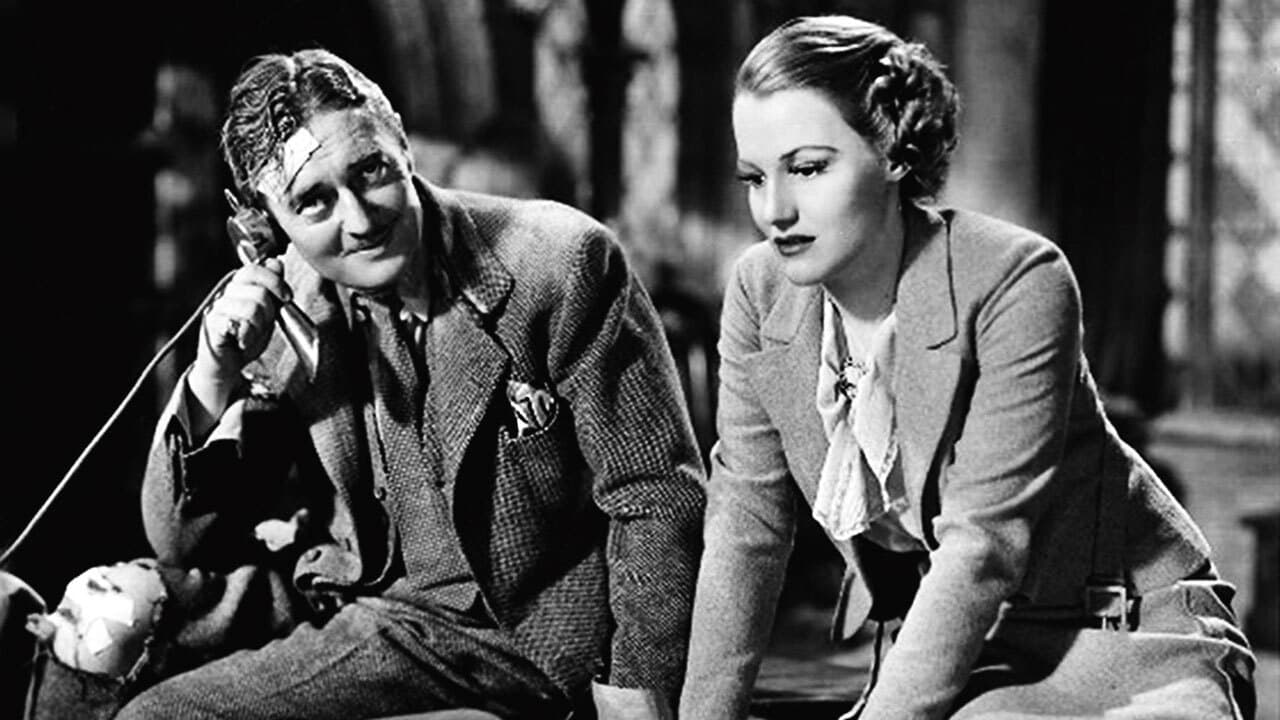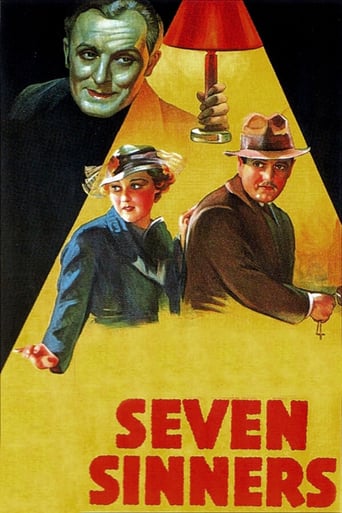Matialth
Good concept, poorly executed.
Beanbioca
As Good As It Gets
Sienna-Rose Mclaughlin
The movie really just wants to entertain people.
Walter Sloane
Mostly, the movie is committed to the value of a good time.
Cristi_Ciopron
A cool British thriller with Edmund Lowe and Constance Cummings, with an eventful storyline and a thoughtful plot, written by Gilliatt; the idea belongs to the pulp tropes, and in fact to the 19th-early 20th century popular fiction, with sinister secret associations and conspiracies, but the identity of the major villain, though obvious, is nonetheless surprising, anyway highly unusual. There are many piquant one-liners, and a sense of the quaint, well conveyed by a few striking physiognomies, foreboded by the opening scenes at the carnival in Southern France, with the mask …. The leads' performances are very generic, which matches the script (where these characters aren't endowed with exceptional insight, but with wit and dynamism, the leads are keen on clues, but not on moral insight, and the gullible and unsuspecting New York detective tips the villain and provides him with the necessary information), as well as the movie's focus on the villains for the suspense and chills.It has a fantastic, dreamlike feel, feverish; Thomy Bourdelle is a villain as obvious but also as effective, as Mowbray in 'Terror by Night'. It's a reminder of how British were Hitchcock's '30s movies.Those who already like the '30s British cinema don't need any further recommendations. Therefore, I would recommend the British 'Seven Sinners' to both Hitchcock's fans, and 'Fantômas'' fans.
Robert J. Maxwell
Edmund Lowe and Constance Cummings are on vacation in France when Lowe stumbles on the body of a bearded dead man. He reports this to the authorities but of course when they return to the scene the body has disappeared. The couple are next involved in a terrific train accident in which the same corpse appears amid the wreckage before it is consumed by fire.This time, there is evidence that the switches were tampered with, and the French police inspector, Thomy Bourdelle, takes an interest in unraveling the mystery and, in fact, makes a five-thousand dollar bet with Lowe that he, Bourdelle, will find the murderer first. Lowe and Cummings track some clues to a peace group in London. Bourdelle follows. I don't think I want to give away the ending because it is, after all, a mystery, and it has an unexpected outcome.I'm loathe to say that this thriller exhibits Hitchcockian properties because all half-way decent thrillers will share some features with Hitchcock's. In this case, though, some of the shared variance is not coincidental. First, by the time of this release, Hitchcock had already made some popular and profitable films, like "The Man Who Knew Too Much" and "The 39 Steps," so imitation was inevitable. Also, the two writers on this film, Sidney Gilliat and Frank Launder, had already worked with Hitchcock and would do so again, on "The Lady Vanishes." So how does it all come off? It's pretty light hearted. Edmund Lowe is rarely serious and leaves wisecracks all over the place. His companion, Cummings, is there mostly to exchange barbs with him, although she's quite attractive too. It moves quickly without being frenzied.The dialog isn't all it could be. Gilliat and Launder were to do better. Well, I'll give two examples.At about the half-way point, the French inspector refers to the five-thousand dollar bet and tells Lowe, "I'm only one step behind you." Lowe: "Don't trip." Lowe and Cummings are in an empty room when two bullets come flying through the window and they drop out of sight. "How do we get out of here?", asks Cummings. Lowe: "They say an army travels on its stomach. Let's join the army." And they crawl through the door.Some viewers may find that sort of thing funnier than I did. There is another great train wreck, a la Hitchcock, and a shoot out in a theater, also a Hitchcock staple.The pursuit itself could be kind of enjoyable, insubstantial though the plot may be, but the lack of real wit and the inclusion of only one truly comic scene (a woman screaming that she's been cheated out of her suckling pig) keep it at a level that can only be called routine.
vaughan.birbeck
Neil-117 is quite correct, the film makers were given permission by the Southern Railway to smash an old locomotive and carriages into a lorry on a disused branch line, hence the spectacular train crash.I think his other comments are a little unfair. The film is taken from a play called 'The Wrecker' by Arnold Ridley (who also wrote 'The Ghost Train' and later became Private Godfrey in 'Dad's Army'). The whole point of the plot is that a serial murderer is staging train crashes to disguise his crimes.Of course the film is dated but it's good, well-paced entertainment. If you enjoy Hitchcock's British thrillers (especially 'The Lady Vanishes', also a Launder and Gilliatt screenplay) you'll like this one.
Neil-117
Mildly amusing scenario of US private detective and female insurance investigator battling for supremacy in solving a series of murders in Europe. Will they kiss and make up in the end? The bad guys are suitably sinister and new ones keep popping up just when you thought you had it all figured out. The script writer must have been short on inspiration as the same device of a train wreck is used no less than three times. But those action sequences are well filmed and I'd swear one of the crashing steam locomotives is the real thing.

